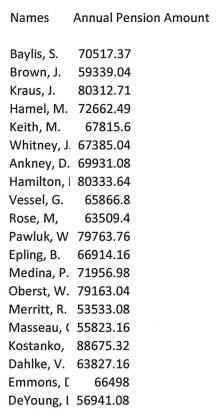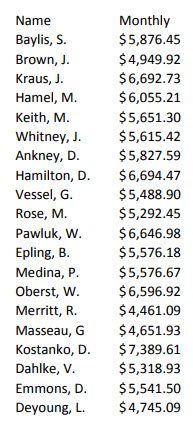|
City gives State Journal incorrect
pension amounts
December 21, 2017
When I read the Lansing State Journal's August 10 story,
"Overtime spikes pensions for dozens of Lansing police, fire retirees,"
I suspected that the pension amounts provided by the City of Lansing
were not the full amounts. Pensions are calculated as service times
final average compensation (FAC) times a multiplier - in this case,
3.2%. For example, if a firefighter has 25 years of service (the minimum
required) and his average pay for the last 2 years was $80,000, his
pension would be $64,000 (25 x 80,000 x .032). This amount is called the
"full retirement allowance," and is not necessarily the same as the
pension. The pension payment amount may be less depending on the survivor
option chosen by the retiree. One option allows the surviving spouse to
receive 75% of the pension, and to pay for it, the pension received by
the retiree is reduced to 93% of the full allowance. Another allows the
surviving spouse to receive 86% of the pension and the pension received
by the retiree is reduced to 86%. The full text of that part of the city
ordinance is
here.
I doubted that the pension amounts
provided the LSJ were the full amounts. The City charged only $338 for
160 retirees. While pension payment amounts were
readily available, the full amounts were less so, and the City would
have charged more to get them.
In the
LSJ story, reporter Beth LeBlanc said
Thirteen Lansing police officers and
firefighters who retired between 2010 and 2016 make more in pension
than the base wage they received in their final year employed by the
city.
Another 57 of the nearly 160 police
and fire retirees during those years receive a pension of between
90% and 100% of what their base pay was in their final year.
If the City had given her the full
retirement allowances rather than pension payment amounts, those figures
would have been higher.
I set about getting the full retirement
allowances. I sent a Freedom of Information Act request asking for the
same information provided to the LSJ, but with straight life pension
amounts. By "straight life" I meant full retirement allowance, not
realizing at that time that the term used in the ordinance was full
retirement allowance. The City
wanted well over $1000, so I
withdrew that request and asked for the same information provided to the LSJ. They sent me that document for free. It is a
168 page PDF document. The first 4 pages are a list
of retirees and amounts. Here's a portion of
the first page:

Each of the remaining 164 pages contained
a document that showed - among other information - the employee's base
pay amount. Here's an example:

Still determined to get the full
retirement allowance, I sent a new request, this time for the
straight life pension amounts for 20 employees who retired in 2015 and
2016. The City responded
with a
one-page list. I was not charged.

Up until then, I hadn't actually read the
section in the ordinance about survivor options, and when I did, I
realized that the term "straight life pension" is not used. I sent a new FOIA request:
I have to apologize. In my previous
FOIA requests, I asked for the "straight life" pension amounts for
certain Police & Fire retirees. I now realize that this term is not
used in the Police & Fire Retirement System. It does not appear in
the ordinance. The term for what I want is "full retirement
allowance." I would like the full retirement allowance for [the 20
Police & Fire Retirement System retirees].
This time, there was a
charge: $125.88. There was no charge for the straight life pension
amounts I'd received earlier. Did that mean that the straight life
pension and the full retirement allowance were different?
I paid the $125.88. On December 1, I got another
one-page
list:

The next day, I sent another another
request:
I realize that in my original FOIA
request I did not specify that I wanted the source documents that
showed the full retirement allowance for the 20 retirees listed in
that request. However, the source documents are what I need, and the
$125.88 I paid should get me more than the single-page list of
retirees and amounts identified only as "monthly" that was provided
. . . As an example of what I mean, I have attached a "Retirement
System Computation Sheet" for a 2011 retiree. That particular
form may no longer be used, but I would expect that something
similar is used that details the computation of the pension.
My request was
denied:

Public Act 347 of 2012 is the bill I've been
complaining about since December 2012, when Governor Snyder signed it
into law:
I appealed the denial to the city council president Patricia Spitzley on
December 11:
Dear Councilwoman Spitzley,
I would like to appeal the denial of a
FOIA request.
On October 17, I requested the "full
retirement allowance" for a list of 20 police and firefighters who
retired in 2015 and 2016. The full retirement allowance is the
calculated pension before any reductions for survivor options. It
has also been known as the straight life pension.
On December 1, after receiving my
payment of $125.88, the Office of City Attorney sent me a one-page
document (attached) listing the 20 retirees along with amounts
identified only as "Monthly." Since the "full retirement allowance"
is normally an annual amount rather than a monthly amount and since
no supporting documents were provided, I suspected that the amounts
provided were monthly pension payment amounts rather than the full
retirement allowance.
| |
On December 2, I submitted a new
request asking for the source documents for the retirement
allowances and I attached a "Retirement System Computation Sheet"
for a 2011 retiree ("Halverson," attached) as an example of what I
wanted.
On December 11, my request was denied
("Denial Letter," attached) because "information regarding the
calculation of actual or estimated retirement benefits . . . are
exempt from disclosure.
I accept that this is the law.
However, the information regarding the calculation of the benefit
could be redacted. That would consist of the final average
compensation (FAC), which is of no interest to me. My only interest
is the "full retirement allowance" or "straight life amount." I
already have retirement date, retirement age and service amount, all
of which are provided in Retirement Board meeting minutes.
Please ask the Retirement Office/City
Attorney to provide the 20 computation sheets with the FAC redacted.
|
 |
|
Patricia Spitzley |
The City has had no
problem with redacting documents
in the past.
I received
her response December 20. She upheld the denial of my request.
Problems with the LSJ story
If the pension amounts the City gave the
LSJ were payment amounts rather than full retirement allowances, the
story understated the number of pensions that exceeded 90% of base pay.
And I do have evidence that the LSJ did not get full retirement
allowances.
Back before April 2013, when the law
prohibiting release of pension details went into effect, I got pension
calculation sheets for dozens of City retirees, including 42 of the
police and firefighters whose pensions and base pay was obtained by the
LSJ. Those calculation sheets included the full retirement allowance.
This chart compares the pension and base pay amounts provided by the
City to the full retirement allowance. For 29 of the 42 - 69% - the full
retirement allowance is more than 90% of the base pay. In the LSJ story,
70 of 160 of pensions exceeded 90% of base pay. That is only 44%.
Not using the full retirement allowance
was one error. The other was giving the wrong multiplier - twice. Here's
the first:
For most Lansing police and fire
retirees, pensions are equal to
2.5% of the final
average compensation multiplied by a maximum of 25 years of
employment. The formula changes slightly depending on which contract
a police or firefighter retires under.
Here's the second:
The multiplier for both departments
for non-supervisor roles has decreased to
2.5%.
The ordinance says that a police officer
hired before August 1, 2014 and a firefighter hired before May 20, 2014
shall have a 3.2% multiplier. Those hired after those dates get a 2.5%
multiplier. So anybody who retires before 2039 is going to have a 3.2%
multiplier. Nowhere in the LSJ article is the 3.2% multiplier mentioned.
Everybody makes mistakes, but when a news
organization makes a mistake, it is expected to issue a correction. It
is expected to value accuracy. On August 11, I sent Beth
LeBlanc an email that said:
Beth, great story about
Lansing police and firefighter pensions. But I think that except for
new hires, the pension multiplier is 3.2% rather than 2.5%.
She replied:
From what I could glean from the
police and fire contracts, the 2.5% -- depending on which contract
youíre looking at Ė largely applies to those hired after 2014. We
included a line in the story saying the changes depend on when an
employee was hired or retired to acknowledge that difference.
I
emailed her again on September 17:
It appears that about half
the Police & Fire pension amounts you were given by the City are
incorrect. Through a FOIA request, I got the same information you
got.
It appears that we were
given the monthly pension payment amount. If the retiree chose the
straight life retirement option, the payment amount reflects the
actual pension. However, if a beneficiary option is chosen, the
payment amount is reduced in order to offset payments to the
beneficiary after the retiree's death, so the payment amount does
not reflect the full value of the pension. The straight life amount
is FAC times .032 times service, and service is always 25 unless the
retiree is age 55 or older or has reciprocal service from another
employer.
I suspected early on that
you were given payment amounts rather than the straight life
pension, and that is why my first FOIA asked for the same info you
got, but with straight life pension amounts. For that, they wanted
to charge me $1710.85. So I settled for the same info you got,
realizing that for several 2010, 2011 and 2012 retirees, I had the
straight life pension amounts, which I got from the actual pension
calculation sheets. The attached document lists 43 of them. For only
about half of them does the straight life amount equal the amount
calculated from the amounts provided by the City. Where the straight
life amount exceeds the calculated amount - 13 out of 43 - I assume
the retiree chose a beneficiary option. Where the calculated amount
exceeds the straight life amount, I have no idea what's going on.
What this means is that
there may be a lot more cases in which pension exceeds base pay than
you thought. It is troubling that no one at the City cautioned you
about using monthly payment amounts. . .
I
got no response. On September 27, I forwarded the above email to LSJ
publisher Rebecca Poynter and executive editor Stephanie Angel with this
note:
| |
I am forwarding you an email
I sent Beth LeBlanc on September 17 pointing out some problems with
her August 10 story, "Overtime
spikes pensions for dozens of Lansing police, fire retirees."
She has not responded.
While that story had a lot
of good information, approximately half the pension amounts she got
from the City of Lansing were incorrect and over a quarter of them
were too low. As a result, your readers were mislead. It is likely
that the pensions of a lot more than 13 exceeded base salary. In
addition, she said the pension multiplier is 2.5%. That is true for
new employees, but for any retiring in the next 20 or so years, the
multiplier is 3.2%.
|
 |
| |
Rebecca Poynter |
|
The City of Lansing's
pension costs are crippling the city and the people deserve nothing
less than the whole truth. I think it would be best for you to issue
a correction rather than have me point out the errors on my website.
I am a long time LSJ reader and would rather support the media than
criticize. I would be happy to meet and discuss this. |
They did not respond.
Defending the high pensions
In
addition to the misleading information in the LSJ article, some of the
people quoted made questionable statements:
-
Eric Weber, president of
International Association of Firefighters 421, said "Not many people
hire broken, busted up police and firemen. Quite frankly, our pension is
all we have. . . After retirement, it's the only income we have."
I
think he exaggerates. These people are retiring in their late 40s and
early 50s. I suspect they are in better physical condition than people
their age with less strenuous jobs. Anyway, disabled doesn't mean
unemployable. Teresa Eisfelder, one of the retirees interviewed for the
article,
retired with a duty
disability and now works for the U.S. Marshalls in Georgia.
I suspect that most
Police & Fire retirees have new
jobs lined up before they retire. Many of them spend large sums to
purchase service credit so they can get out in less than 25 years. Here
are some whose new jobs were in the news:
|

Eric Weber |
-
Mark Alley, Lansing's former chief of police, retired in March
of 2010 to take a job as senior director of risk management for
Emergent BioSolutions Inc. in Lansing. His title now is Vice
President of Global Protective Services and Public Affairs.
We don't know his new salary, but we do know that his
pension from the City is $90,356. Alley retired at
age 48. He had only 24 years and one month of service, so he
purchased another 11 months at a cost of $107,812.
-
Police Lieutenant
Bruce Ferguson retired in 2010 at age 50 with a
$66,507 pension.
In January 2013, he became chief of police for the City
of DeWitt at a salary of $65,000. (Lansing State
Journal, 1/26/2013)
-
David Ford and Walter
Holden retired from the Fire Department in June 2010 to
run First Due Fire
Supply in Mason - established April 2007. Ford's pension is
$70,356 and
Holden's is
$62,288.
Employees also include Lansing firefighter Chris Wheeler and
duty disability retiree Dan Hamel (retired 7/20/2010, pension
$45,560).
Ford and Holden later sold the company to Hamel and are
"working on some other ventures."
-
State Rep. Tom Cochran, D-Mason,
retired as Lansing's fire chief in January, 2012 at age 58.
He receives a pension of approximately $77,000 from the City
to supplement his $71,685 salary as a state representative.
-
Lansing police captain Ray Hall
retired in February 2012 at age 49 to take a job with University of
Michigan-Flint as chief of police. According to
this
response
to my FOIA request, his new salary is $103,000. His City of Lansing
pension
is $73,178. He was 16 months shy of the 25
years needed to qualify for a pension, so he purchased
16 months.
-
In July 2013, former Lansing police chief Teresa Szymanski landed a job as
the Lansing School District's chief operations officer. She
retired from the Lansing
police force on April 19, 2013 at age 50, with 26 years of
service. Her salary on her new job is
$120,000. Her annual pension from
Lansing's Police and Fire Retirement System is about
$90,000, based on what her predecessor
Mark Alley got when he
retired in March 2010.
-
In February 2014, Lieutenant Noel
Garcia retired from the Lansing Police Department after 24
years (LSJ, 2/28/2014). He immediately took a job as law
enforcement instructor for the Lansing Area School District
at a
salary of $62,631. His pension is
approximately $60,000.
-
In November
2014, at age 45, assistant fire chief Trent Atkins accepted the new
position of Emergency Operations Manager at the Board of
Water and Light. His salary was $130,000. He was 9
months short of the 25 years needed to qualify for a City of
Lansing pension, so he purchased them. His pension will
be "around $70,000." (LSJ, 11/25/14)
He resigned from the BWL just recently,
saying "he has offers to do consulting work and wants to
spend more time with his family." (LSJ, 5/20/17)
-
Daniel Oberst
was chief of training for the Fire Department when retired
on April 18, 2015. His pension is about $79,000. He is now fire chief
for Bath Township, where his salary is
$61,675.
-
Detective Teresa
Eisfelder retired 3/20/2012 at age 46 with a duty disability. She now works for the U.S.
Marshalls in Georgia as a federal court security officer. Her
pension is $64,936 (LSJ,
8/10/17).
What's often overlooked, [IAFF
president Eric] Weber said, is the fact that police and fire
retirees in Michigan do not receive Social Security. As a result,
pensions for public safety employees are often higher than others.
Not getting Social Security at age 66 or
67 does not justify a generous pension
at 50. Currently, the full benefit age is 66 for people born in
1943-1954. It will gradually rise to 67 for those born in 1960 or later.
And Weber fails to mention that while Lansing police and firefighters
don't get Social Security, neither do they pay in to Social Security.
And by the way, Eaton County sheriff
employees do participate in social security. And still get a 3.2%
pension multiplier.
-
In
reference to an abandoned state-level proposal to
exclude overtime from final average compensation, Thomas Krug, head of
the union that represents Lansing police officers, is quoted as saying
"I do not think itís fair to cut overtime out when [overtime is
mandatory]". It is not that officers will not get paid time-and-a-half
for overtime; they just wouldn't get paid twice by using it to boost
their pensions. And whether it was intentional or not, the contract
requirement assigning overtime to those with most seniority ensures
that police in their last 2 years get that extra income included in
their FAC.
Send comments, questions,
and tips to
stevenrharry@gmail.com, or call or text
me at 517-505-2696. If
you'd like to be notified by email when I post a new story, let me
know.
Previous stories
|
 |
|
Tom Krug |
|